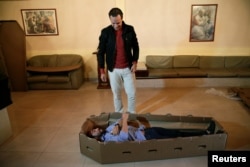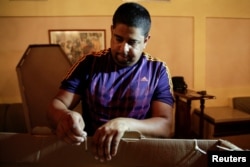When Venezuelan entrepreneurs Alejandro Blanchard and Elio Angulo decided to create cardboard coffins, they were looking for an ecological selling point to compete against classic wood and brass caskets.
Three years on, with the oil-rich country mired in deep economic crisis, their "bio-coffins" are becoming a viable option because of high prices for wooden coffins and shortages of brass ones.
Blanchard and Angulo are offering their product in funeral homes in Venezuela, home to one of the world's highest murder rates, and business is looking promising.
"Death impoverishes the masses ... and the bio-coffin is a solution for this crisis Venezuela is suffering," said Blanchard before presenting his goods in a funeral home in the central city of Valencia.
Biodegradable coffins are in vogue in Europe and the United States, but they are also finding a niche in Venezuela in the face of shortages, triple-digit annual inflation and a deep recession.
A wooden coffin in Venezuela can cost 280,000 bolivars, equivalent to about a year of earnings at minimum wages and about four times that of a biodegradable coffin.
"The bio-coffin can reduce funeral costs by around 80 percent," said Miguel Salazar, the president of a funeral home network in central Venezuela, after watching a presentation about the coffin.
Made of recycled corrugated fiberboard, the bio-coffin is light, can hold up to 230 kilos (500 pounds) and can be put together in less than 10 minutes.
Three hundred bio-coffins can be made with the number of trees required to build a single wooden coffin and require about half the amount of fuel during cremation. Blanchard and Elio Angulo say they have received orders from Colombia, Ecuador and Peru.
While the crisis is set to drive the coffins' popularity at home, Blanchard, who runs an environmental non-governmental organization, hopes the trend will also raise ecological consciousness.
"When we conserve the environment, we help preserve life: the living are the most valuable, not the dead," he said.














